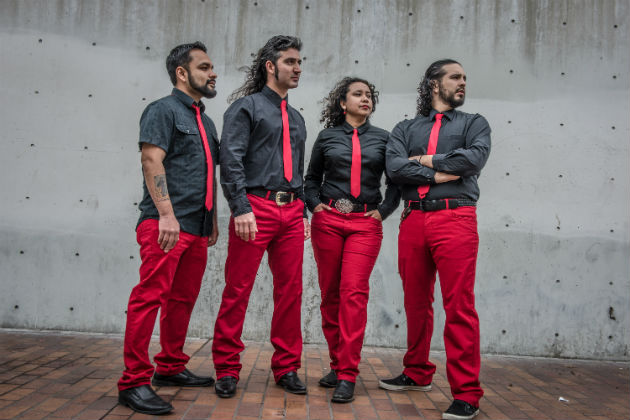Viento Callejero:
Un Choque in East L.A.

“Like all people, we perceive the version of reality that our culture communicates. Like others having or living in more than one culture, we get multiple, often opposing messages. The coming together of two self-consistent but habitually incomparable frames of reference causes un choque, a cultural collision.”
— Gloria Anzaldúa, 1987
Chican@ music is not a genre, but rather an embodied experience. For almost one hundred years, musicians coming out of barrios in the southwestern United States have been articulating the complex identities and politics of a people. This trajectory includes Lalo Guerrero and Don Tosti, Ritchie Valens, Freddie Fender, Eva Ybarra, Agustín Lira y Alma, Los Lobos, The Brat, and many more, including the group I started with my friends over twenty years ago.
Like others before them, the band Viento Callejero is born from this choque (collision). How else do you explain a tribute to Colombian big band composers like Lucho Bermudez, mixed with Peruvian chicha and other Afro-diasporic sounds, translated in Los Angeles’s Boyle Heights neighborhood by guitarist Gloria Estrada, bassist Federico “Lico” Zuñiga, and drummer Gabriel Villa?
The result is a refreshing and empowering expression that challenges patriarchal notions of who and what is rock music.
“We’re fusing different styles, different genres, which is what we grew up with—the blues, R&B, gospel, traditional Colombian, the sonidero,” Estrada explains.
Of their affinity for cumbia, Zuñiga adds, “There’s a piece of something inside the cumbia for everyone. Its roots in European, Indigenous, Middle Eastern, African music—we all find ourselves in these rhythms.”
Following a long tradition of groups from the Eastside barrio, Viento Callejero collaborates often with different organizations and social causes. They use these moments to grow and learn, while contributing to the social justice struggle. Most notably, its members innovated the idea of a “front person” working with various singers from around East Los Angeles to build a stronger and more connected community of musicians.
“I lead the group in some ways, but the group is democratic,” Estrada says. “We have a system of consensus. Being a female musician and Latina has been a challenge since fifteen years ago, stepping into the world of music. I’ve worked hard not to get discouraged when people have been disrespectful. If anything, it lights a fire in my belly to prove people wrong.”
This fire contributes to Viento Callejero’s live energy—an experience that expresses the celebration and intimacy of backyard parties, the urge to groove and to share a message, and the choque between nostalgia and the new.
Viento Callejero, with vocalist Antonio Tony Sauza, will perform at the 2015 Folklife Festival’s Ralph Rinzler Memorial Concert on Sunday, June 28, at 5 p.m.
Quetzal Flores is a community organizer, cultural worker, and artist. Since 2002, he has been the musical director for the East Los Angeles-based rock group Quetzal, whose fifth album, Imaginaries, was released by Smithsonian Folkways Recordings in 2012. He works as the Los Angeles program manager for the Alliance for California Traditional Arts.

